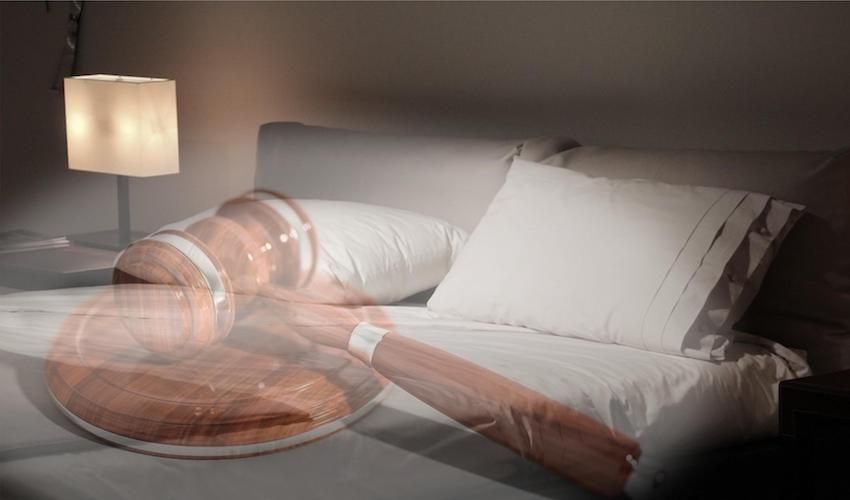

A wannabe States legal adviser, whose job offer was apparently torn up after it emerged he wanted to commute between Jersey and the UK, has failed to convince the Royal Court he was actually sacked due to discrimination over his sleep disorder.
Mr A applied for permission to bring judicial review proceedings to challenge the Law Officers' department’s decision to revoke their job offer, which he says was due to his dyslexia and sleep apnoea.
Mr A claimed that, because he had been allegedly discriminated against, his previous job offer should be reinstated - "either within the Law Officers’ Department or the States of Jersey at large" - as well as receiving monetary damages and an apology.
But the Law Officers' Department argued the offer was revoked because he had suggested leaving the office early each Friday to fly home.
Pictured: The man was applying for permission to bring judicial review proceedings against the Law Officers' Department based in Morier House.
The case ended up coming before the Royal Court, where it was dealt with by Bailiff Sir William Bailhache, who considered the evidence before compiling his findings in a written judgment.
It explained that Mr A, who does not live in Jersey, “successfully applied for a job as a legal adviser in the relatively newly formed economic crime and confiscation unit of the Law Officers’ Department."
Having passed all the required criminal and medical checks, Mr A was under the impression that “he had a job offer which was unconditional,” but after some correspondence with Howard Tobias, the Director of the Criminal Division of the department, the job offer was withdrawn.
It is within this correspondence – three emails sent in June of last year and a phone call around the same time – that Mr A claims he was discriminated against because of his two conditions. However, the Bailiff found that, “...it is impossible to take from those email exchanges any act of discrimination on the part of Mr Tobias."

Pictured: The case was summarised in a written judgment penned by the Bailiff Sir William Bailhache.
The judgment notes that in his emails, Mr A addressed "at length the questions of sleep apnoea and dyslexia,” but that Mr Tobias at no point identified them as reasons for withdrawing the job offer.
In fact, the Bailiff found that Mr Tobias set out his reasons for the offer withdrawal: Mr A's proposed weekly commute to the island, which included leaving work early on Fridays to fly home.
In one of his emails, Mr Tobias explained to Mr A: "Firstly, we require our employees to be residents of Jersey (even more so as the role attracts an essential licence to reside on the island), and this forms part of our civil servants’ T&C’s. This regular commute for an extended period of time also poses the problem of potential concern around workload capacity, and practical time management organisation.
"Also and on a more basic level, such a regular commute in the manner you describe would conflict with the States of Jersey policy (attached) – it would be impossible for you to use the 3.35pm or 5.05pm flights on Fridays whilst maintaining the core hours stipulated in the policy (which require staff to be in the office until 4.30pm Monday to Thursday and until 4pm on Friday... I should add that Jersey being an island, the weather can also be uncertain, and this means that flights to and from are regularly delayed or even cancelled. Although I am sure you have the best intentions at heart, it is quite critical to the work of the team that whoever is employed can settle in Jersey fairly swiftly."

Pictured: The Bailiff did not exercise the Royal Court's powers to grant leave to bring judicial review proceedings against the department.
He added: "I appreciate that this will come as a disappointment to you. The Department is agreeable to sympathetic treatment being applied in relation to costs which you may have incurred to date."
In his judgment, the Bailiff observed that Mr A may feel that this email from Mr Tobias “does not contain the full reasons for the decision” and that he “may well think that underlying this decision is a discrimination based on his disability", even though this was not the case.
Mr A also alleged that he had suffered discrimination during a phonecall with Mr Tobias amid the email exchange, but Sir William noted that there was "no evidence" of this.
Dismissing the judicial review application, the Bailiff concluded: “I cannot see on the evidence provided that there is a sufficiently sound basis to assert either that the decision taken was unreasonable, procedurally incorrect or illegal… these being the traditional three grounds upon which leave to bring judicial review proceedings is given.”
Comments
Comments on this story express the views of the commentator only, not Bailiwick Publishing. We are unable to guarantee the accuracy of any of those comments.